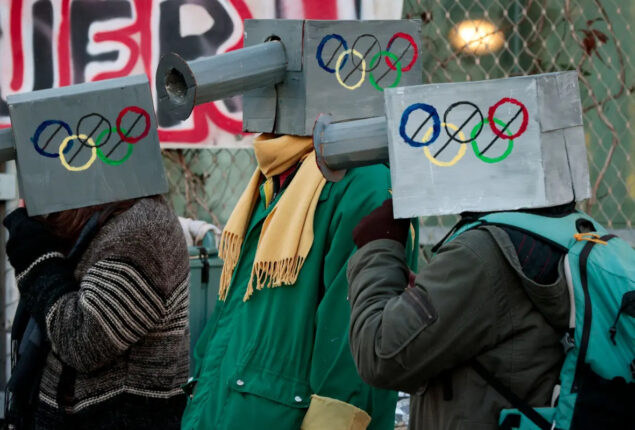Meghan McCain claims she “Urged” to compete the Olympics after giving delivery
Meghan McCain is speaking up about the pressures she is under to...

French lawmakers clash over AI surveillance cameras at Olympics in Paris
Opponents are outraged by the French government’s plans to test artificial intelligence-enhanced surveillance cameras during the 2024 Olympics. They claim this is an unnecessary and potentially dangerous security overreach.
Critics view the proposed law as a gift to French industry at the expense of essential civil liberties, despite the fact that the government asserts that such systems are required to manage crowds of millions and identify potential dangers.
The plan “creates a surveillance precedent never before seen in Europe,” according to the daily Le Monde, which reported that around 40 mostly left-leaning members of the European Parliament warned French lawmakers in an open letter last week.
In the National Assembly, France’s lower parliamentary chamber, discussions began late Monday and will continue Friday.
MPs had already submitted 770 amendments to the government’s extensive Olympics security bill, many of which targeted Article Seven before the debates even began.
That section says that video recorded by new or existing surveillance systems, like cameras mounted on drones, can be “processed by algorithms.”
“Detect in real-time pre-determined events likely to pose or reveal a risk” of “terrorist acts or serious breaches of security,” such as unusual crowd movements or abandoned bags, would be detected by artificial intelligence software.
The events would then be reported by systems to the police or other security agencies, who would be able to choose how to respond.
The French public is wary of technologies being applied too broadly, so the government insists that the smart camera tests will not use facial recognition or process biometric data.
MPs were informed by Sports Minister Amelie Oudea-Castera, “The experiment is very precisely limited in time… and the algorithm does not substitute for human judgment, which remains decisive.”
A survey conducted in February by the interior ministry and published in the daily Figaro suggests that widespread support exists for the use of cameras in public areas, particularly stadiums.
Be that as it may, rivals say the plans exceed the limits of the French constitution and European regulation.
Computerized freedoms bunch La Quadrature du Net (QDN) wrote in a report shipped off legislators that the frameworks would as a matter of fact handle delicate “biometric” information under an expansive 2022 definition from France’s privileges ombudsman.
QDN argues that as biometric data, these characteristics would be protected by the strong General Data Protection Regulation (GDPR) of the European Union.
That finding was rejected by a spokesperson for the interior ministry, who insisted that neither facial recognition nor biometric data were utilized in the planned processing.
The bill says that the camera test will last until the end of 2024, long after the games are over and covering other big events like the Rugby World Cup later this year.
Public agencies in the Paris region responsible for transport security and emergency services will be able to request its use once the law is passed.
“The most complete and relevant evaluation” necessitates that it “cover a significant number of large events,” according to the interior ministry.
However, activist Naomi Levain of the QDN told AFP: Using the Olympic Games to pass things that wouldn’t pass in normal times is classic.
“It’s understandable for there to be exceptional measures for an exceptional event,” Socialist MP Roger Vicot told the chamber on Monday. “We’re going beyond a text aimed at securing the Olympic Games.”
According to Elise Martin, an MP for the hard-left opposition party France Unbowed (LFI) who was following the process, the bill was just the most recent of a slew of new security powers granted by President Emmanuel Macron since 2017.
She stated, “The way this law is thought out is as if we live in a state of emergency that lasts forever.”
Meanwhile, Levain of QDN emphasized that “many of the leaders in this market are French businesses,” describing the provisions of the bill as a “favour to industry.”
In a 2022 article that was published by the organization that represents the video surveillance industry, AN2V, the size of the market for video surveillance in France alone was estimated to be 1.7 billion euros ($1.8 billion), while the size of the business globally was significantly larger.
According to Levain, the law, if it is approved, would make the Olympics in 2024 “a shop window and a laboratory for security.” This would provide businesses with the opportunity to test systems and collect training data for their algorithms.
In a legal gray area at the moment, some French cities, like Marseille, a Mediterranean port, are already using “augmented” surveillance.
Similar to how text AIs like ChatGPT are trained on large amounts of written material before they can produce their own written output, such data is needed to teach computer programs what kinds of behavior to flag as suspicious.
However, opponents claim that there is little or no evidence that the proposed law’s augmented surveillance or even more conventional CCTV systems can prevent crimes or other incidents in the vicinity of major cultural and sporting events.
According to Levain, smart cameras “wouldn’t have changed anything at the Stade de France” last year, when huge crowds of Liverpool supporters were crammed into small spaces while awaiting entry into the Champions League final.
She continued, “That was bad human management,” noting that “no camera can do that.” “There’s know-how to manage a crowd, calculations to be made about placing barriers and directing flows,” she said.
Catch all the Sports News, Breaking News Event and Latest News Updates on The BOL News
Download The BOL News App to get the Daily News Update & Follow us on Google News.